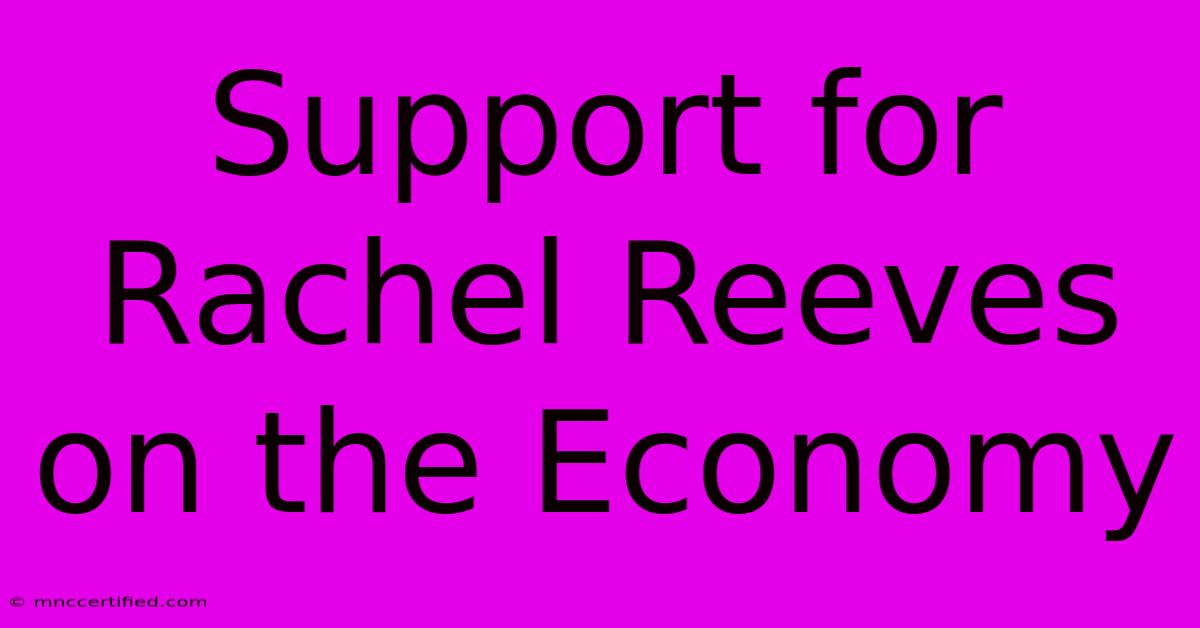Support For Rachel Reeves On The Economy

Table of Contents
Support for Rachel Reeves' Economic Policies: A Deep Dive
Rachel Reeves, the Shadow Chancellor of the Exchequer for the UK Labour Party, has presented a distinct economic vision for Britain. While her policies have garnered both praise and criticism, understanding the arguments for and against her approach is crucial for anyone interested in UK politics and economics. This article will delve into the key aspects of her economic platform and explore the arguments supporting her vision.
Key Pillars of Reeves' Economic Strategy
Reeves' economic platform centers around several core tenets:
1. Fiscal Responsibility and Investment:
A core element of her strategy is a commitment to fiscal responsibility alongside targeted public investment. Unlike some previous Labour manifestos perceived as overly reliant on borrowing, Reeves emphasizes responsible spending within a framework of sustainable public finances. This involves a focus on long-term economic growth fueled by strategic investments in infrastructure, education, and green technologies. The argument here is that these investments are not simply expenditures but vital for boosting productivity and creating higher-paying jobs in the long run.
2. Made in Britain Focus:
Reeves advocates for a stronger focus on domestic manufacturing and production. This "Made in Britain" approach aims to boost domestic industries, create jobs, and enhance the UK's economic resilience. Supporters argue this will reduce reliance on global supply chains, improve national security, and potentially lead to higher wages for British workers. The emphasis is on supporting existing industries and fostering innovation to create new, high-skilled jobs.
3. Fairer Taxation and Wealth Distribution:
Reeves' plan also includes proposals for a fairer tax system. While specific proposals vary, the overarching aim is to redistribute wealth more equitably. This often involves targeting higher earners and corporations with higher taxes, while offering targeted support for lower-income households. Proponents argue this will reduce inequality and stimulate demand, benefiting the overall economy.
4. Green Growth and Sustainability:
A significant portion of Reeves' economic strategy focuses on green growth and environmental sustainability. She has outlined plans for significant investment in renewable energy, green infrastructure, and a transition to a low-carbon economy. Supporters believe this is not just environmentally responsible but also economically beneficial, creating new jobs in the green sector and attracting investment in innovative technologies.
Arguments in Favor of Reeves' Approach
The support for Reeves' economic policies stems from several key arguments:
- Long-term vision: Her focus on long-term investment, rather than short-term fixes, is praised by many as a necessary shift towards sustainable economic growth.
- Balanced approach: The combination of fiscal responsibility and targeted investment is seen as a more pragmatic approach than purely austerity-based or excessively expansionary policies.
- Addressing inequality: Her emphasis on fairer taxation and wealth redistribution resonates with those concerned about growing economic inequality in the UK.
- Future-proofing the economy: Investment in green technologies and a sustainable economy is seen as essential for the UK's future competitiveness and resilience.
- Promoting domestic industries: The focus on "Made in Britain" resonates with those who want to see a stronger manufacturing sector and a reduction in reliance on global supply chains.
Counterarguments and Criticisms
While Reeves' economic vision has considerable support, it also faces criticism:
- Tax increases: Proposed tax increases on corporations and higher earners have been met with resistance from some businesses and individuals.
- Funding challenges: Critics question the feasibility of funding ambitious investment plans without significantly increasing national debt or implementing further tax increases.
- Economic impact uncertainty: The actual economic impact of certain policies, such as the "Made in Britain" initiative, is subject to debate and depends on various factors.
- Green transition challenges: The transition to a low-carbon economy presents significant challenges, including potential job losses in certain sectors and the need for substantial investment.
Conclusion: A Balanced Perspective
Rachel Reeves' economic policies represent a significant departure from some past approaches. While criticisms exist, her focus on long-term investment, fiscal responsibility, and a fairer distribution of wealth appeals to many. Ultimately, the success of her vision will depend on the effectiveness of implementation and the overall economic climate. Further analysis and debate are crucial to fully assess the potential impacts of her proposed policies on the UK economy. Understanding both the support and criticisms allows for a more informed discussion of the future economic direction of the UK.

Thank you for visiting our website wich cover about Support For Rachel Reeves On The Economy. We hope the information provided has been useful to you. Feel free to contact us if you have any questions or need further assistance. See you next time and dont miss to bookmark.
Featured Posts
-
Bristol City On Right Track Manning
Dec 23, 2024
-
Week 16 Nfl Vikings Seahawks Score
Dec 23, 2024
-
Usyks Moment Duboiss Accusation
Dec 23, 2024
-
Belfast Airport Flight Cancellations After Emergency
Dec 23, 2024
-
Liverpool 6 3 Tottenham Game Recap
Dec 23, 2024